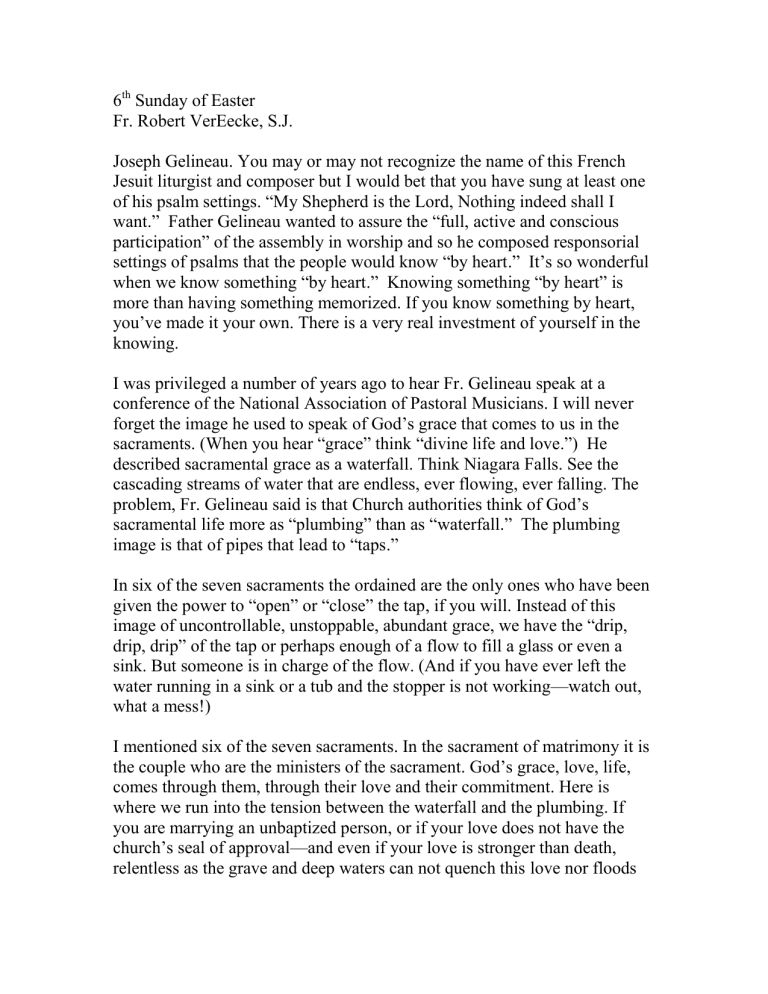6 Sunday of Easter Fr. Robert VerEecke, S.J.

6 th
Sunday of Easter
Fr. Robert VerEecke, S.J.
Joseph Gelineau. You may or may not recognize the name of this French
Jesuit liturgist and composer but I would bet that you have sung at least one of his psalm settings. “My Shepherd is the Lord, Nothing indeed shall I want.” Father Gelineau wanted to assure the “full, active and conscious participation” of the assembly in worship and so he composed responsorial settings of psalms that the people would know “by heart.” It’s so wonderful when we know something “by heart.” Knowing something “by heart” is more than having something memorized. If you know something by heart, you’ve made it your own. There is a very real investment of yourself in the knowing.
I was privileged a number of years ago to hear Fr. Gelineau speak at a conference of the National Association of Pastoral Musicians. I will never forget the image he used to speak of God’s grace that comes to us in the sacraments. (When you hear “grace” think “divine life and love.”) He described sacramental grace as a waterfall. Think Niagara Falls. See the cascading streams of water that are endless, ever flowing, ever falling. The problem, Fr. Gelineau said is that Church authorities think of God’s sacramental life more as “plumbing” than as “waterfall.” The plumbing image is that of pipes that lead to “taps.”
In six of the seven sacraments the ordained are the only ones who have been given the power to “open” or “close” the tap, if you will. Instead of this image of uncontrollable, unstoppable, abundant grace, we have the “drip, drip, drip” of the tap or perhaps enough of a flow to fill a glass or even a sink. But someone is in charge of the flow. (And if you have ever left the water running in a sink or a tub and the stopper is not working—watch out, what a mess!)
I mentioned six of the seven sacraments. In the sacrament of matrimony it is the couple who are the ministers of the sacrament. God’s grace, love, life, comes through them, through their love and their commitment. Here is where we run into the tension between the waterfall and the plumbing. If you are marrying an unbaptized person, or if your love does not have the church’s seal of approval—and even if your love is stronger than death, relentless as the grave and deep waters can not quench this love nor floods
sweep it away—your love is not sacramental. (At least in the plumbing analogy.)
But people do “know by heart” that the waterfall of God’s grace can be experienced even if their love does not fit into the approved categories.
I offer you this image of waterfall versus plumbing this morning for two reasons. The first comes from the reading from the Acts of the Apostles.
While Peter was still speaking these things, the Holy Spirit fell upon all who were listening to the word:
The circumcised believers who had accompanied Peter were astounded that the gift of the Holy Spirit should have been poured out on the Gentiles also, for they could hear them speaking in tongues and glorifying God.
Then Peter responded,
"Can anyone withhold the water for baptizing these people, who have received the Holy Spirit even as we have?"
He ordered them to be baptized in the name of Jesus Christ.
God’s spirit is poured out like a waterfall on these Gentiles, those who were
“the other.” They were not Jews. They were not circumcised. How could
God possibly include those who were “different” from them? But as Peter says: I see that God shows no partiality. God’s spirit is acting in these
Gentiles even before they have become “official.” The reminder to us, even now, is that God’s grace, God’s spirit, God’s waterfall of love cannot be controlled or contained. It is not measured. Yes, in one sense, the tap can be turned on and off. The Church offers us the “ordinary” means of receiving grace in its sacramental life if we follow the rules and procedures. But let’s not forget the “extraordinary” ways in which God’s spirit, God’s love, God’s grace is poured out on us, God’s people.
The second reason I offer you Fr. Gelineau’s image of “church plumbing versus God’s waterfall” is that the Gospel and first letter of John “plumb” the depths of the heart of God. They speak so beautifully and powerfully and simply of who God is at heart: “God is Love.”
“As the Father has loved me, so I have loved you.” “Remain in my love.”
“In this is love, not that we have loved God, but that God has loved us first and sent his son as expiation for our sins.” “Love one another as I have loved you.”
I would hope that you know these verses of scripture “by heart.” Why?
Because they offer us the essence of who God is. In a conversation yesterday with someone who was talking about “not believing in God” because there was no physical evidence, no tangible proof of the existence of God, I should have said: What about love? Not the romantic, sometimes fickle attraction that can masquerade as love. No, the love you know that demands sacrifice, that says I will give my life freely for you even when it is not easy or convenient.
I think that is why it is so wonderful that these scriptures that speak of God who is love are heard on this Mother’s Day. Most of us can see in our mother’s love the love that must be of God. That is why so many people know God as mother. A mother is one who gives her life, literally, so that we might have life. I am reminded of Julian of Norwich, the English mystic who called Jesus our tender mother since he feeds us with his body and blood as a child in the womb receives the body and blood of his mother. I am reminded also of the speech given by Soujourner Truth, the anti slavery activist at the Women’s Convention in 1851.
Then that little man in back, he says women can't have as much rights as men, 'cause Christ wasn't a woman! Where did your Christ come from?
"Where did your Christ come from? From God and a woman! Man had nothin' to do with Him."
So on this 6 th
Sunday of Easter, on this mother’s day, let us pray that we may receive that waterfall of God’s love that takes flesh and blood in Jesus Christ and the gift of his life for us. Let us pray in gratitude for that waterfall of love that takes flesh and blood in a mother’s love. Plumb the depths of
God’s love for you. Know this by heart. In this is love, not that we have loved God, but that God has loved us first… and foremost.



